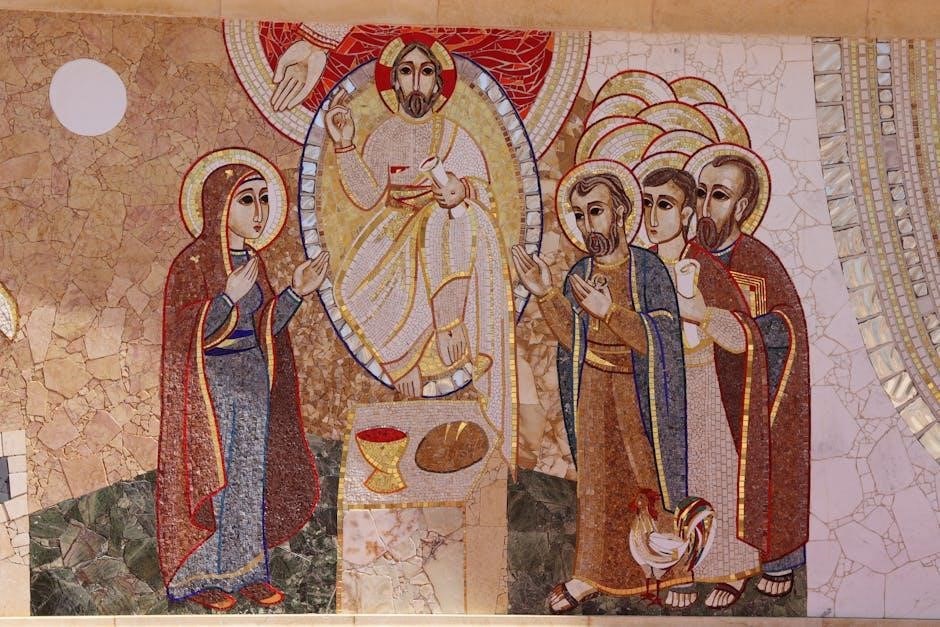
The 12 Apostles, chosen by Jesus Christ, were ordinary men with no extraordinary skills or refined backgrounds. They included fishermen, tax collectors, and other common individuals. Despite their simplicity, they played a pivotal role in spreading Jesus’ teachings and establishing the early Christian church. Their lives were transformed by their faith, and they became pioneers of the New Testament, leaving a lasting legacy in Christianity.
Overview of the Apostles and Their Role in Christianity
The 12 Apostles, handpicked by Jesus Christ, were instrumental in spreading His teachings and establishing the foundation of the Christian church. These men, though ordinary in their backgrounds, were entrusted with extraordinary responsibilities. They served as Jesus’ closest disciples, accompanying Him during His ministry, witnessing His miracles, and receiving direct instruction from Him. Their primary role was to preach the Gospel, heal the sick, and cast out demons, effectively extending Jesus’ mission beyond His physical presence.
After Jesus’ resurrection and ascension, the Apostles became the leadership core of the early Christian church. They were empowered by the Holy Spirit at Pentecost, enabling them to boldly proclaim the message of salvation to the world. Their teachings emphasized faith in Jesus Christ, repentance, and the promise of eternal life. The Apostles also played a crucial role in resolving disputes, guiding believers, and maintaining unity among the growing number of followers.
Their influence extended beyond Jerusalem as they traveled to distant lands, spreading Christianity to both Jews and Gentiles. For example, Peter is often recognized as the leader of the early church in Jerusalem, while Paul, though not one of the original 12, became a prominent missionary after his conversion. The Apostles’ missionary work laid the groundwork for the global spread of Christianity, shaping its doctrine, practices, and traditions.
Despite their divine calling, the Apostles faced significant challenges, including persecution, martyrdom, and personal struggles. Their willingness to endure suffering for their faith underscored the depth of their commitment to Christ. Their legacy endures as pillars of the church, inspiring generations of believers to live out their faith with courage and devotion.

The Characteristics of the 12 Apostles
The 12 Apostles were ordinary men with no special skills or status, yet they were transformed by their faith in Jesus Christ. They shared traits like loyalty, courage, and humility, despite their human weaknesses. Chosen for their willingness to follow and learn, they became leaders in spreading Christianity. Their characteristics reflect a deep commitment to their faith, which empowered them to overcome challenges and inspire others, leaving a lasting impact on the church and its teachings.
Common Traits and Qualities Among the Apostles
The 12 Apostles shared several common traits and qualities that defined their lives and ministries. Despite their diverse backgrounds, they were united by their unwavering faith in Jesus Christ and their commitment to His teachings. Loyalty and dedication were hallmark characteristics, as they left their livelihoods to follow Jesus and spread His message. Their humility and willingness to learn were evident, as they often relied on Jesus for guidance and wisdom.
Courage was another defining quality, as many faced persecution and hardship for their belief in Christ. Despite their fears and doubts, they demonstrated remarkable resilience and perseverance. Their simplicity and lack of formal education made their transformation into bold preachers and leaders all the more remarkable. Additionally, they shared a deep sense of compassion and love for others, reflecting Jesus’ own ministry of healing and service.
Though they were not without flaws, their willingness to grow and overcome weaknesses set them apart. For instance, Peter’s impulsiveness and Thomas’ skepticism were challenges they faced, but these traits also highlighted their humanity and relatability. Their collective journey from ordinary men to extraordinary leaders exemplifies the transformative power of faith and discipleship. These shared qualities not only united the Apostles but also inspired countless believers throughout history.
Unique Personality Traits of Each Apostle
The 12 Apostles, while sharing common traits, also exhibited unique personality traits that distinguished them from one another. These individual characteristics played a crucial role in their ministries and interactions with Jesus and others. Understanding these traits provides deeper insight into their lives and the diversity of the early Christian community.

Simon Peter, for instance, was known for his boldness and impulsiveness. He often acted without hesitation, as seen when he walked on water to meet Jesus or when he defended Him in the Garden of Gethsemane. His outspoken nature sometimes led to mistakes, but it also demonstrated his deep loyalty and willingness to take risks. In contrast, John, often referred to as the “Apostle of Love,” was known for his gentle and compassionate heart. His deep emotional connection to Jesus and his focus on love and fellowship set him apart.
Thomas, often called “Doubting Thomas,” was marked by his skepticism and analytical mind. His famous question, “How can we know the way?” reveals his desire for clarity and certainty. While this trait sometimes led to doubt, it also highlights his honesty and willingness to seek truth. On the other hand, Philip was known for his practicality and problem-solving skills. He often served as a bridge between Jesus and those seeking Him, demonstrating a gift for connecting people to the divine.
Judas Iscariot, though ultimately remembered for his betrayal, was once a trusted member of the group. His role as the treasurer suggests he was detail-oriented and responsible, yet his love for money and desire for power led to his downfall. His story serves as a cautionary tale about the dangers of greed and the consequences of unchecked ambition.
These unique traits highlight the diversity among the Apostles and illustrate how their individual strengths and weaknesses were used by God to further His mission. Their distinct personalities remind us that God works through imperfect and varied individuals to achieve His purposes.
The Lives and Missions of the Apostles
The 12 Apostles were sent by Jesus to spread His teachings across the world. After His resurrection, they became the foundation of the early Christian church, preaching, healing, and baptizing believers. Each Apostle undertook unique missions, with some evangelizing in distant lands while others remained in Jerusalem. Their lives were marked by courage, perseverance, and sacrifice, as many faced persecution and martyrdom. Their efforts laid the groundwork for the global spread of Christianity, leaving a lasting legacy of faith and service.
Simon Peter: The Rock of the Church

Simon Peter, one of the most prominent figures among the 12 Apostles, is often referred to as the “Rock of the Church.” Jesus gave him the name Peter, meaning “rock,” symbolizing his foundational role in the early Christian church (Matthew 16:18). Peter was a fisherman from Galilee and one of Jesus’ closest disciples, known for his boldness, faith, and leadership.
Peter’s life was marked by significant moments of faith and weakness. He was the first to recognize Jesus as the Messiah (Matthew 16:16) and demonstrated extraordinary faith by walking on water to meet Jesus (Matthew 14:28-29). However, he also showed human frailty, denying Jesus three times before the crucifixion (Matthew 26:69-75). Despite this, Peter repented and became a key figure in the early church, preaching at Pentecost and leading the disciples after Jesus’ resurrection.
Peter’s mission took him to spread Christianity among the Jews and Gentiles. He performed miracles, healed the sick, and baptized new believers. His leadership and courage earned him respect, and he became a symbol of strength for the fledgling church. Eventually, Peter’s unwavering commitment to his faith led to his martyrdom in Rome during Emperor Nero’s persecution, where he was crucified upside down, a testament to his devotion.
Peter’s legacy endures through his writings, the First and Second Epistles of Peter, which offer guidance on living a godly life and enduring persecution. His story exemplifies redemption and the transformative power of faith, making him a timeless inspiration for believers worldwide.

- Peter was a natural leader and one of Jesus’ most trusted disciples.
- He was the first Apostle to preach to the Gentiles, expanding Christianity beyond the Jewish community.
- His life illustrates the balance between human weakness and divine grace.
Peter’s journey from a humble fisherman to a courageous apostle and martyr highlights the profound impact of his faith and obedience, solidifying his place as the “Rock of the Church.”





